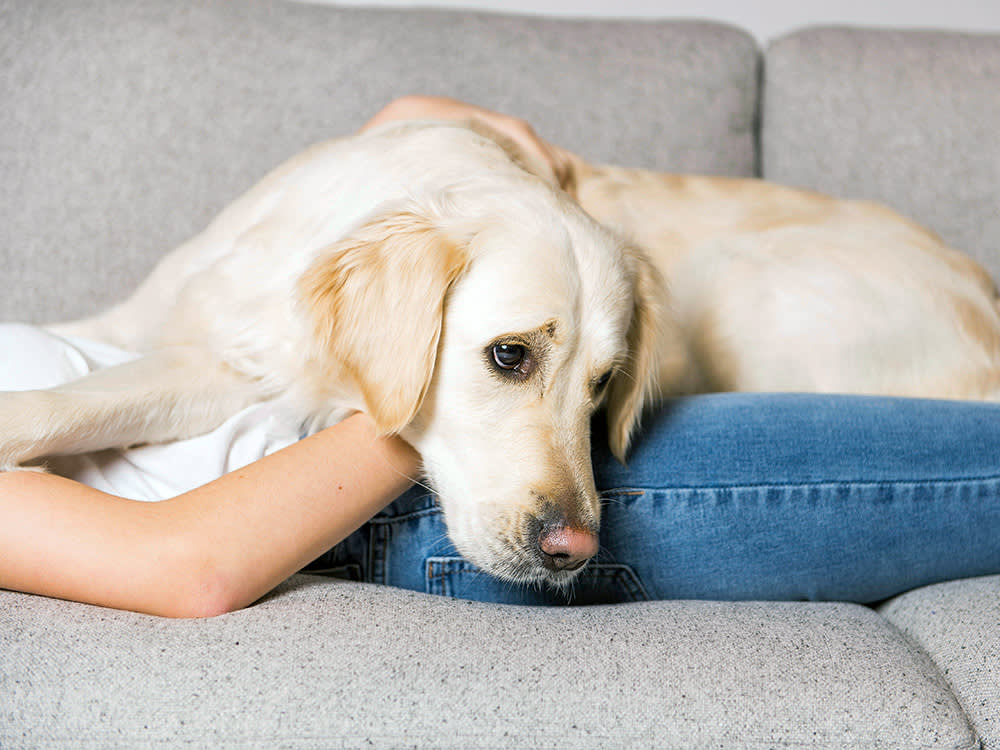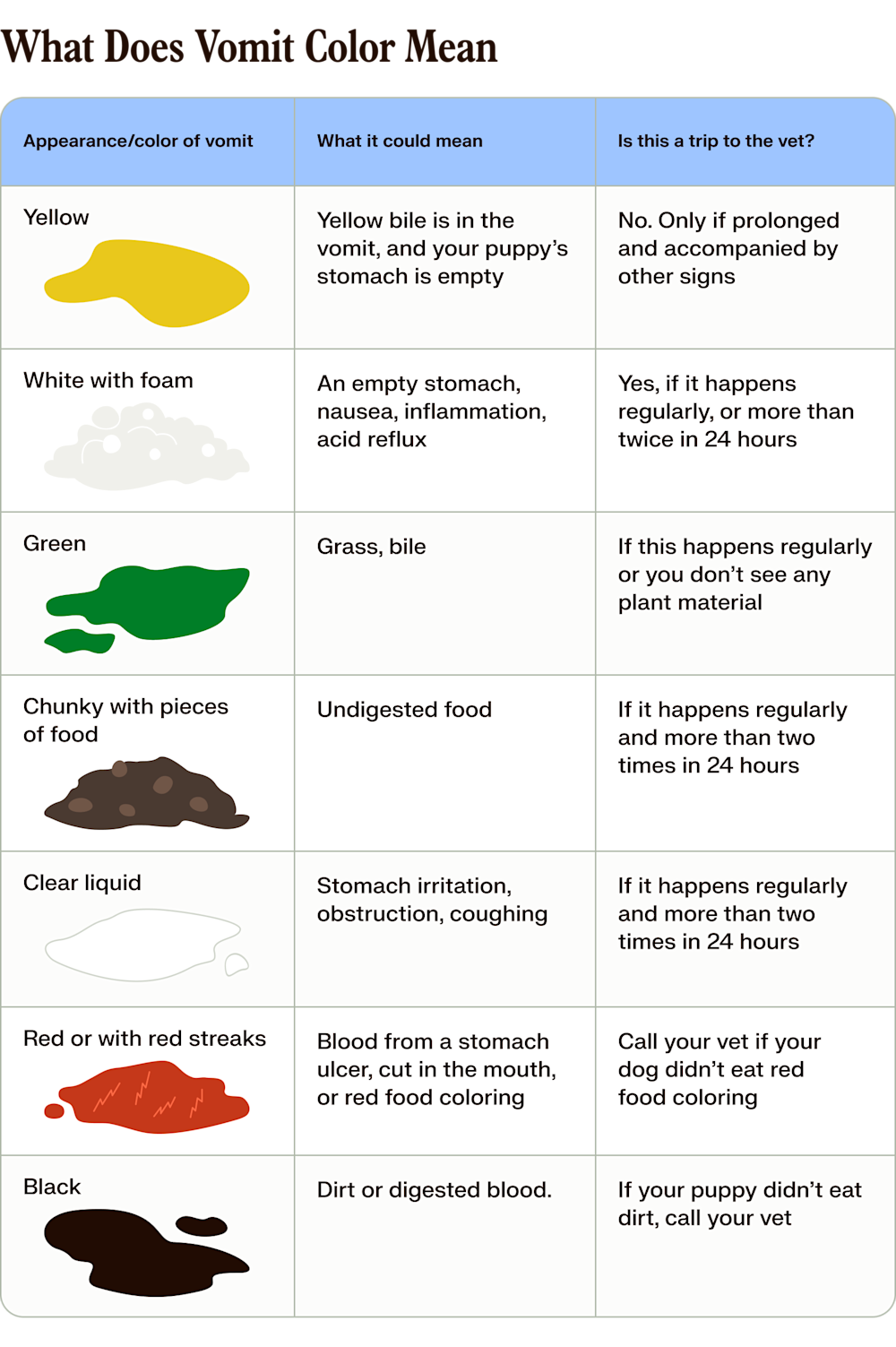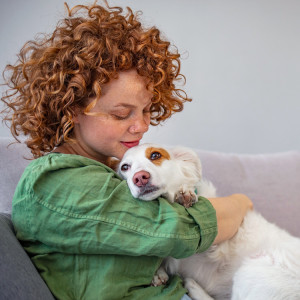7 Reasons Why Your Puppy Keeps Throwing Up and What to Do About It
Here are common reasons why puppies throw up.

Share Article
In This Article
Why Does My Puppy Keep Throwing Up?opens in a new tab Difference Between Normal vs. Abnormal Throwing Up in Puppiesopens in a new tab Puppy Puke Chart: What Different Types of Puppy Vomit Meanopens in a new tab Common Reasons Why Puppies Vomitopens in a new tab Immediate Steps To Take If Your Puppy Throws Up opens in a new tab When to Worry: Signs it’s Time to Call the Vet for Your Puppy Vomitingopens in a new tab How to Treat Vomiting in Puppiesopens in a new tab How to Prevent Your Puppy From Throwing Up in the Futureopens in a new tab Final Thoughts: Why Your Puppy Keeps Throwing Upopens in a new tab Frequently Asked Questionsopens in a new tab
Puppies are full of energy and curiosity, but that curiosity, coupled with their sensitive stomachs, can sometimes lead to bouts of throwing up that concern pet parents. Every puppy is bound to vomit from time to time, but you need to know the possible causes and if you need to involve your veterinarian. This guide explores the common reasons behind puppy vomiting, how to address it, and tips to prevent it in the future.
Main takeaways
Puppies throw up for many different reasons.
The appearance of the vomit can give clues about the cause.
There are immediate steps to take if your puppy throws up.
If there are additional signs other than vomiting, it’s time to call your veterinarian.

littleKin™ is Kinship’s home just for puppy and kitten parents. Bop over to check out expert advice, new pet tools, and special deals—all curated for your newest family member.
opens in a new tabWhy does my puppy keep throwing up?
There are many possible causes of throwing up in puppies, so it can be difficult to figure out the reason your pup is vomiting. Your job is to collect as much information as possible and call your vet as needed. Understanding the cause is critical to providing the right treatment. Causes can range from eating too fast to ingesting a toxin to stress. Each of those reasons would have a different treatment. Be as observant as possible if your puppy throws up. It’s not pleasant to get close to and decipher their vomit or poop, but it can make a huge difference in your pup’s health.�
Difference between normal vs. abnormal throwing up in puppies
Vomiting in puppies can either be a minor issue or a sign of something seriousopens in a new tab. Here’s how to distinguishopens in a new tab between the two:
Normal vomiting occurs once or twice, appears to be associated with excitement or eating too much, and resolves quickly. Your puppy will act as though they feel well, and there will be no other symptoms.
Abnormal vomiting occurs several times in one day or continues beyond 24 hours. It may be accompanied by other symptoms such as diarrhea, anorexia, or lethargy. If abnormal vomiting occurs, you will need to get your vet involved.
Recognizing the difference between the two is critical to getting the right help for your puppy.
Regurgitation vs. throwing up
If food comes right back up after your puppy eats it and looks like a passive process without retching, it is regurgitation. Vomiting, on the other hand, is a very active process. It involves retching, abdominal muscle contraction, and emptying the stomach’s contents.
Puppy puke chart: what different types of puppy vomit mean
Sometimes, the color of your puppy’s vomitopens in a new tab can tell you or your vet a fair amount about the cause of your puppy’s throwing up.
Common reasons why puppies vomit
There are so many possible reasonsopens in a new tab why a puppy could vomit that sometimes it’s impossible to tell without the help of your vet and tests. However, some causes are easy to figure out and treat at home. Below are some of the more common causes.
Eating too fast
This is a common cause. Puppies frequently get so excited about their food that they gulp it down too quickly. When that happens, they often vomit undigested food shortly afterward. Something you can try at home is feeding smaller meals more frequently. A slow feeder bowl may also help.
Sudden changes in diet
If your puppy doesn’t like their food or their diet disagrees with their sensitive stomach, you may need to change to a different food. However, you must change from one food to another gradually; if you do it suddenly, it can cause vomiting or diarrhea. It should take a week or even two to make the transition. Start by adding a small amount of the new food to the old. Add more new food than the previous day and less old food every couple of days.
Bacterial or viral infection
Puppies are more susceptible than older dogs to contracting bacterial or viral infections.
Bacterial infections in puppies:
Leptospirosis: This infection, caused by the leptospira bacteria, can damage both the kidneys and the liver. Puppies may exhibit fever, vomiting, and lethargy.
Salmonella: Contaminated food or water is the main source of this infection, which can cause diarrhea, fever, vomiting, and abdominal pain.
Bordetella bronchiseptica (kennel cough): A bacterial component of kennel cough, bordetella leads to coughing, vomiting, nasal discharge, and difficulty breathing.
Viral infections in puppies
Viruses can be more dangerous, even life-threatening, if not treated promptly. These infections usually spread through contact with other animals or contaminated surfaces. Common viral infections include:
Parvovirus: Highly contagious and possibly fatal, this virus can cause severe vomiting, diarrhea, lethargy, and dehydration. It primarily affects unvaccinated puppies.
Distemper: This virus affects the nervous, respiratory, and gastrointestinal systems. Symptoms include fever, nasal discharge, vomiting, seizures, and tremors.
Canine Influenza: This viral infection causes symptoms similar to kennel cough, including coughing, nasal discharge, vomiting, and fever.
Adenovirus (infectious canine hepatitis): This virus affects the liver and other organs, leading to fever, vomiting, jaundice, and abdominal pain.
As you can see, there are some dangerous bacteria and viruses that can affect your puppy.
Eating something toxic
Many human foods, household plants, and household cleaners are toxic to dogs. If you suspect your puppy has ingested something it shouldn’t have, go to your vet immediately.
Intestinal parasites
Roundworms, hookworms, giardia, coccidia, whipworms, and other parasites are common in puppies and can lead to vomiting. Your puppy will be dewormed at every vaccine visit in the early months, but getting rid of all parasites can take some time. Don’t rule out intestinal parasites when trying to find the cause of vomiting. Take a fecal sample to your vet every time you go to your puppy appointment, and they will look under the microscope for parasites.
Stress
Puppies and even grown dogs can feel very stressed about a new environment, the addition of a new pet or person to the household, travel, loud noises, and a host of other things. This stress can upset their tummies and cause vomiting.
Obstructions in the intestines
If your puppy eats a foreign object, such as a toy or bone, the intestines can become obstructed, and theopens in a new tab puppy can get very ill. Vomiting will be one of the main signs. This is an emergency, so if there’s a possibility this has happened, rush to the vet.
Immediate steps to take if your puppy throws up
If your puppy vomits more than once and there are no other signs or blood in the vomit, try the following:
Fast. Keeping the stomach empty for a few hours gives your puppy’s belly time to settle down.
Monitor their behavior. Check for other symptoms, such as diarrheaopens in a new tab, lethargy, or discomfort. Press gently on the abdomen to see if there seems to be pain.
Inspect the vomit. Look at color and texture, and check for any sign of blood.
After fasting, offer a small amount of fresh, room-temperature water.
Reintroduce food slowly: Start with small amounts of bland food like boiled chicken and rice.
If your pup has other symptoms, blood in the vomit, or cannot keep down water or bland food, contact your veterinarian immediately.
If your puppy can keep down water and a bland diet and has no other symptoms, continue the bland diet for a day or two, then gradually transition back to regular food.
When to worry: signs it’s time to call the vet for your puppy vomiting
While many cases of vomiting can be treated at home, there are times when your pup definitely needs the vet:opens in a new tab
Vomiting several times in a day.
Blood or unusual color in the vomit.
Diarrhea, lethargy, or refusal to eat.
Signs of dehydration, such as sunken eyes, dry gums, or failure of the skin to spring back up when you pinch it.
Suspected ingestion of toxic substances or foreign bodies.
In any of these instances, calling the vet is the safest thing you can do.
How to treat vomiting in puppies
Treatment depends on the cause but may include:
Changing the diet. Consider a sensitive stomach diet.
Feed smaller, more frequent meals.
A slow feeder bowl may be helpful.
Your vet may prescribe anti-nausea medications or antibiotics for certain conditions if there’s an infection.
If parasites are a concern, medications will be given.
If your puppy is dehydrated, they may be given fluids under the skin or IV.
If there is an obstruction, your puppy may need surgery.
As you can see, discovering the underlying cause is critical to administering the proper treatmentopens in a new tab to stop your puppy’s vomiting.
How to prevent your puppy from throwing up in the future
Not every episode of vomiting in puppies can be prevented. However, we can do a lot to prevent many of them, especially the dangerous ones.
Feed smaller, frequent meals to avoid overeating.
Transition to new foods gradually.
Puppy-proof your home to prevent access to toxic substances.
Keep your puppy’s vaccinations and deworming up to date.
Provide a calm environment to reduce stress.
If you follow those suggestions, you’ll have fewer incidents of puppy vomiting in your home, and both you and your puppy will be happier.
Final thoughts: why your puppy keeps throwing up
Vomiting in puppies can range from harmless to serious. By observing their behavior and the characteristics of their vomit, you can determine the best course of action. When in doubt, always consult your veterinarian. Your vet will take a history, conduct a thorough exam, and possibly suggest some tests such as blood work, fecal exams, X-rays, and, if necessary, even ultrasounds, MRIs, or CT scans. Getting to the underlying cause is extremely important so the appropriate treatment can be prescribed.
FAQs
Why is my puppy throwing up with diarrhea?
This indicates a more serious cause of diarrhea, and your puppy should be seen by your vet right away. Not only does your vet need to discover the underlying cause of the vomiting and diarrhea, but having both can lead to dehydration quickly.
What can I give my puppy when they throw up?
The first thing you should do is remove all food and fast your puppy for a few hours. Leave fresh water down. After fasting, offer a small amount of bland, boiled chicken and boiled white rice and see if your puppy keeps that down. If they can’t keep the water down or the bland food down, call your vet at once.
What does parvo throw up look like?
Vomit from a puppy with parvo can look slightly different depending on the stage of the illness:
Clear or frothy: Early in the illness, the vomit may appear clear with foam or froth due to stomach irritation.
Yellow or green: This occurs when bile is expelled, especially if the puppy hasn’t eaten due to lack of appetite.
Brownish: In some cases, vomit may contain digested blood, which gives it a dark or coffee-ground appearance.
Texture:
Watery and thin: Vomit in parvovirus cases often has a liquid consistency.
Mucus-like: Some puppies may throw up mucus due to digestive tract irritation.
How do I get my puppy to stop throwing up?
Leave water down, but take up all food and fast for several hours. Then, offer a bland diet of chicken and rice, both boiled and plain. If your pup can keep the food and water down without vomiting, continue the bland diet for a couple of days, then gradually reintroduce the usual diet.
References
Radford, Alan D., et al. “Outbreak of Severe Vomiting in Dogs Associated with a Canine Enteric Coronavirus, United Kingdom - Volume 27, Number 2—February 2021 - Emerging Infectious Diseases Journal - CDC.” Wwwnc.cdc.gov, wwwnc.cdc.gov/eid/article/27/2/20-2452_article, https://doi.org/10.3201/eid2702.202452opens in a new tab.

Dr. Shelby Neely, DVM
Dr. Shelby Neely is a freelance writer and veterinarian who graduated from The University of Pennsylvania and has practiced veterinary medicine for 30 years. She has found homes for hundreds of stray pets and has two cats as well as four grand-dogs and two grand-cats. In her spare time, Dr. Neely likes to be with her three children, their dogs and cats, and her own two cats. She also likes to see as many Broadway shows as possible.
Related articles
![Woman with her dog relaxing in living room.]() opens in a new tab
opens in a new tabHow to Tell If Your Dog Is Sick
Look out for these warnings signs so you know when to call the vet.
- opens in a new tab
Can Humans Get Dogs Sick?
Think of the amount of tissues you’d need...
![]() opens in a new tab
opens in a new tabCan Dogs Get the Flu from Humans?
Or is it OK to snuggle them close while we recover?
- opens in a new tab
Can Dogs Get Colds?
We’re all sniffling this time of year. Learn if your pup can get a cold, too.
- opens in a new tab
Do Dogs Fake Being Sick for Attention?
We’d all love to think that our pups are sweet baby angels incapable of deceit. But are they, actually?
![dog cuddling their pet parent on the couch]() opens in a new tab
opens in a new tabWhy Does My Dog Throw Up Yellow Bile?
It’s not a pretty sight, but it’s important to know what’s going on.








